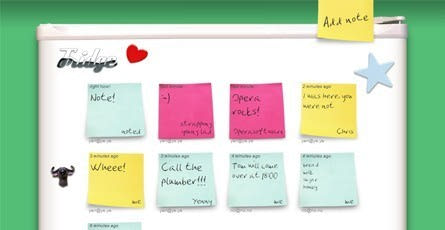this week, Opera 10.10 shipped with a web server built-in into the web browser. The Unite server came with webapps like Web Server, Photo and File Sharing, and a Fridge. Yes, I will get back to that last one later.
Contrary to what the name might suggest, Opera Unite was intended to decentralize the web rather than unite it. It was intended to “reinvent the web” by making everyone host their own internet content and communications. Two and a half years later, Opera discontinued it entirely.
Opera Unite was a technology platform with two components: The first, and most interesting, was the Unite server. It was built into the web browser and people would host web applications and content from their own PCs.
If you turned off your PC, then your server would go down and your webapps and content would become inaccessible. This concept is easy to understand for the computer-literate, but it’s not something most people have ever had to deal with in their lives.
The second component was the centralized Opera Unite service. It provided people with a third-level domain name to make it easier to access their servers. The service could also proxy connections through Opera’s servers in cases where direct person-to-person connections couldn’t be established. This second component was necessary when encountering corporate firewalls or old routers without UPnP support that blocked direct connections.
People didn’t flock to the Opera web browser to get their own web server. Even existing users had trouble finding a use for Unite. As I said earlier, Opera Unite was a technology platform. You needed to install a Unite-capable web app, available in the Opera Add-On Catalog, to make it do anything.
There weren’t a whole lot of webapps available at launch. Only a handful more webapps would be developed for the platform during its lifetime. Here are some Unite-apps highlights from the Opera Add-On Catalog:
- Fridge: a public place where people could leave post-it notes on your virtual fridge door.
- File sharing: share and host files publicly.
- File inbox: let strangers upload files to your computer.
- Music streaming: make your music file collection accessible to the public.
- Photo sharing: make and share photo albums publicly.
- Web server: publish your own website.
- Messenger: chat with your friends.
- Webcam: stream your webcam live on the web.
These webapps were quite good at what they did. They were utilitarian and got the job done. It was just the tiny problem of having to explain to grandma why the link you sent to your Unite photo album didn’t work when she tried opening it. Assuming you could even understand the problem yourself. It always worked when you tested from your laptop, right?
Not having to rely on a third-party, often commercial, service to publish and share photos, documents, and other files makes a lot of sense in a democracy. People expect to access their files on the go even when they’re not in front of their computer. However, people’s primary computer these days is a smartphone and not an always-on laptop or desktop PC. These devices are power and bandwidth constrained; which make them unsuited for hosting any kind of server.
Okay, so we’ve got to take a moment to talk about the Fridge app. It sounds silly but it was featured heavily in Opera’s PR push at the time. However, it made a little more sense back in the late-90s and into the mid-2000s. Back in the day, the website guest book or a shoutbox was the only social component you could expect to find on a personal website.
A website guest book was a dedicated page where you could sign your name and leave a comment for others who’d visit the website later. This was a big deal at one point in the history of the web. You could even purchase fake guest book entries to make yourself seem more popular.
Shoutboxes were less permanent forms of guest books where people could write either “Hey!” or yell abuses at each other across the internet.
In this environment, the Fridge app did make a bit of sense. Even though it was quite late to this fad. The fridge may be the center of many households. However, asking families to make a public Opera Unite webpage hosted on the family PC the new virtual fridge was a big ask.

The Fridge app in all its glorious 2009-era skeuomorphic design
Opera Unite didn’t support encrypted connections. Unencrypted HTTP connections were the default back then, and it wasn’t unusual for websites and personal communications to be transmitted in this fashion. This would be an unacceptable privacy and security risk, by today’s standards, of course.
Opera Unite couldn’t deliver encryption given the ecosystem at the time and its architecture. If Unite had launched today, however, it could have used a free and automated encryption-certificate provider like Buypass and Let’s Encrypt.
Now, ten years later, the web has become a much more centralized place than it was back when Unite launched. The internet has become a larger part of our lives, yet we don’t even control our own identities. Our personal information has become a commodity to be traded by big corporations.
Power-users who could have found value in Opera Unite have flocked to more server-oriented solutions like Nextcloud instead. It seems no one wants to commit to leaving their personal computers on all day.
Opera Unite’s big failure was that it was a solution in search of a problem. I described Unite as a “technology platform” earlier in this article. No one but nerds wants to use a technology for the sake of the technology. Unite’s webapps caused more problems for people than they solved.
Opera Unite was called “project alien” internally at Opera Software. It was something new and alien to the web browser. Maybe also suggesting that it didn’t ever really belong there in the first place.
